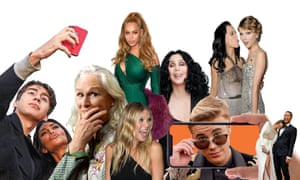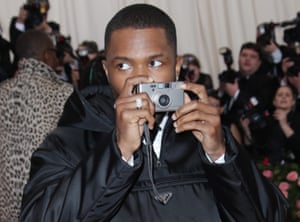Selfies, influencers and a Twitter president: the decade of the social media celebrity

I have a friend, Adam, who is an autograph seller – a niche profession, and one that is getting more niche by the day. When we met for breakfast last month he was looking despondent.
“Everyone takes selfies these days,” he said sadly, picking at his scrambled eggs. “It’s never autographs any more. They just want photos of themselves with celebrities.”
Anyone who has attended a red carpet event or watched one on TV, knows that selfies have firmly supplanted autographs, with fans lurching desperately towards celebrities with outstretched phones instead of pens and paper. Celebrities have adapted accordingly. In 2017, a video of Liam Payne went viral that showed him miserably working his way down a line of selfie-takers, his smile lasting as long as it took for each fan to press click.
A photo of oneself with, say, Tom Cruise, feels more personal than a mere scribbled signature, which he could have given anyone (and could have been signed by anyone). But the real reason selfies have abruptly rendered autographs as obsolete as landline telephones is because of social media. Instagram is made for photos, not autographs, and what’s the point of having your photo taken with Payne if you don’t then immediately post it and watch the “OMG!”s and “NO WAY!!!!”s come flooding in? If you stand next to a celebrity and your friends don’t like the photo, did it ever happen? Do you even exist?
Instagram launched in 2010, four years after Twitter, six years after Facebook. Although social media was originally pitched as a way for people to keep in touch with their friends, it quickly also became a way for people to feel greater proximity to celebrities, and to flaunt this closeness to others. Facebook, with characteristic hamfistedness, attempted to monetise this in 2013, when it announced it was trialling a feature that would allow users to pay to contact celebrities for a sliding scale of fees: 71p for Jeremy Hunt, £10.68 for Tom Daley. But there was no need for people to spend money for the privilege, because celebrities had already proven extremely keen to bend down low and share their lives with the peasants. When Demi Moore appeared on David Letterman in 2010, she was already so addicted to Twitter she continued to tweet while live on air to millions. (“This stinks,” Letterman griped.)
The appeal of social media for a celebrity is obvious, in that it allows them to talk to the public without those awful middlemen: journalists. The past decade is littered with examples of why celebrities (and their publicists) now prefer social media (which they can control) to giving interviews (which they cannot.) It’s unlikely that Michael Douglas would have tweeted that his throat cancer was caused by cunnilingus, as he told the Guardian’s Xan Brooks in 2013 (and for which he later publicly apologised to his wife, Catherine Zeta Jones). It’s even less likely that Liam Neeson would have made an Instagram story about the time he went out hoping to kill a “black bastard” after a friend was raped, as he said in an interview this year. Why risk such disasters when, instead, you can just take a flattering photo, slap a filter on it and post it to your already adoring followers? Mega celebrities with a hyper-online fanbase – Justin Bieber, Beyoncé, Frank Ocean – can now go for years without giving an interview and their careers are helped rather than harmed for it.
Instagram is an airbrushing app, one that lets people touch up their photos, specifically, and their lives, generally, by deciding what they choose to post. (When Jennifer Aniston finally joined social media last month, and momentarily broke the internet, she naturally chose Instagram over the bearpit of Twitter.) Some are more honest about this than others: after he married Kim Kardashian – the celebrity who more than any other has made a virtue out of artifice – Kanye West proudly told reporters in 2014 that the two of them spent four days of their honeymoon in Florence playing with the filters on the wedding photo, that they eventually posted on Instagram, “because the flowers were off-colour and stuff like that”.
You wonder what they’d do with all that time if the internet didn’t exist – cure cancer, perhaps? Musician John Legend and his wife Chrissy Teigen have established a new kind of fame for themselves with their regular social media posts: with Teigen complaining about Donald Trump on Twitter; both of them posting photos of their perfect family on Instagram. Teigen is considered more “real” than her friend Kardashian because she is funny and doesn’t take money to advertise dodgy weight-loss supplements. But their photos are as idealised and managed as any Hello! shoot. The reason Teigen – a heretofore relatively little known model – has over 26 million followers on Instagram is because she hits that social media sweet spot, which is to be (to use two of the more grating buzzwords of the decade) aspirational and authentic.
At the beginning of this decade, it was the aspirational side of the equation that was deemed more important – leading to the rise of a new kind of celebrity: the influencers. This bewildering group of people suggest their lives are so perfect that, by showing us photos of how they eat, dress, parent, travel, decorate, exercise, put on makeup and even cure themselves of illness, they will influence us to do the same. For the successful, the money was suddenly limitless, as brands realised that the public trusted influencers more than adverts, and so threw money at them to endorse their products; Kylie Jenner, a makeup influencer, currently makes $1m per sponsored post. This was always a delicate bubble and it finally began to burst last year, when the Advertising Standards Authority decreed that influencers need to spell it out when they’re being paid to promote something. Writing “ADVERT” beneath that perfect photo of you chugging some Smart Water next to a waterfall doesn’t really boost one’s authenticity.
Even more problematic were the Fyre Festival debacle and the fall of YouTube stars such as Logan Paul and PewDiePie, scandals that eroded the relationship between online celebrities and their followers. It turns out influencers weren’t more trustworthy than adverts; in fact, in the unregulated world of the web, they were markedly less so.
An older demographic has sneered at influencers, as they did with the previous decade’s reality TV stars, suggesting they are not “real” celebrities. This is an absurd complaint, given that some influencers have more followers than traditional movie stars do. Yet influencers atomise audiences in a way traditional celebrities don’t: even if you have never bought Vogue, you’ll know who Cindy Crawford is; unless you follow Chiara Ferragni on social media you will likely have no idea who she is – and yet the fashion influencer has four times as many followers as Crawford.
Ironically, the rise of the influencer began with a very old-school celebrity, one who is frequently accused of being the embodiment of the worst kind of elitist privilege: Gwyneth Paltrow. When Paltrow launched her wellness website, Goop, in 2008, few would have predicted it would reshape both Paltrow’s career and cultural notions of what constitutes an aspirational lifestyle. Paltrow helped usher out the 2000s trend for bling and Cristal, swapping them for yoga clothes and gluten-free kale crisps, making discreet asceticism the ultimate A-lister look. Which is more authentic is debatable, but the biggest swap Paltrow made was personal: she went from being an Academy Award-winning actor to online influencer. And, given that her company is now estimated to be worth $250m, she probably made the more lucrative choice.
Happily, not everyone uses social media to hawk fantasy images of themselves. Occasional glimpses of reality peek through, to everyone’s delight, and by “reality” I mean “feuds”. We’ve had Katy Perry and Taylor Swift’s long-running snarky subtweets aimed at one another. There were Kim Cattrall’s explicit swipes at Sarah Jessica Parker on Instagram. After her brother died, she wrote: “I don’t need your love or support at this tragic time @sarahjessicaparker. Let me make this VERY clear. (If I haven’t already.) You are not my family. You are not my friend. So I’m writing to tell you one last time to stop exploiting our tragedy in order to restore your ‘nice girl’ persona.” Most recently, Coleen Rooney accused “Rebekah Vardy’s account” of selling stories about her to the tabloids. One can only feel deep pangs of regret that Bette Davis and Joan Crawford died before either had access to an iPhone.
As much as young celebrities tout the importance of authenticity, those who come across as most genuine tend to be the older ones – perhaps because they are less internet savvy, or, more likely, have fewer media managers. Bette Midler and, in particular, Cher have really come into their own on Twitter, gleefully sharing their often emoji-heavy thoughts on Trump and politics in general. (“What do you think of Boris Johnson?” one tweeter asked Cher. “F-ing idiot who lied to the British ppl,” the goddess replied, rightly.) And while Instagram may be best known for hyper-stylised photos of, say, Beyoncé holding her newborn twins, the most purely enjoyable celebrity accounts belong to Glenn Close – she posts candid videos of herself and her dogs, always liked by Michael Douglas – and Diane Keaton, who posts decidedly unstylised photos of herself. “YES, I AM WEARING [TROUSERS] UNDER A SKIRT” is a typical all-caps caption. Ever wanted to know what Annie Hall would be like online? Now you know.
Of course, the downside to being able to reach one’s public directly is that the public can reach back. Stars from Stephen Fry to Nicki Minaj have publicly left social media sites after the audience proved a little less admiring than they hoped. “Stan” – or obsessive fan – culture has blossomed. Sometimes this has been to the celebrity’s benefit: Lady Gaga’s fan squad, the Little Monsters, amped up her Oscar campaign for A Star Is Born. But if stans feel they have been let down by the object of their obsession, they will viciously bully the (usually female) star, as Katy Perry and Demi Lovato have experienced. As a result, many celebrities have turned off the comments on their accounts, so we can hear them but they can’t hear us. So much for getting closer.
And yet, for all the fascination social media currently exerts, the celebrity stories that will have the most enduring impact did not start there. There had been rumours about Harvey Weinstein for years, but he was ultimately undone by good old-fashioned investigative reporting, by Jodi Kantor and Megan Twohey at the New York Times, and Ronan Farrow at the New Yorker. Michael Jackson, R Kelly, Woody Allen, Max Clifford, Kevin Spacey and Bryan Singer became pariahs (in Jackson’s case, posthumously) when their accusers spoke to journalists. Caitlyn Jenner introduced herself to the world, not on social media, but on the cover of Vanity Fair. When Prince Harry and the Duchess of Sussex, the artist formerly known as Meghan Markle, spoke out against the “campaigns” against her, they directed their anger towards the print media (and the Mail on Sunday in particular). Ironically, this could be seen as rather reassuring to the newspaper industry: sure, our sales are falling, but for a certain kind of celebrity, print is still what matters.
Nonetheless, this decade has, in a very profound way, been shaped by the social media celebrity. Donald Trump did not emerge from the online world; he came to prominence through the traditional format of TV. But he has taken advantage of the way Twitter prioritises personality over expertise: it doesn’t really matter what you say, as long as you say it in a way that captures the most attention; and the public has grown accustomed to this kind of communication. In the early part of the decade, Trump gave himself a Twitter makeover; it was a platform where he could move from being the embodiment of obnoxious Manhattan privilege (bragging in interviews that he wouldn’t rent an apartment to anyone on welfare), to the say-it-like-it-is kinda guy, the one who tweets about the dangers of vaccination. When he ran for the presidency, Trump maintained this persona, and many people assumed that’s all it was – a persona – and one he would drop once in office. Well, we all know how that turned out.
Now he, and in this country, Boris Johnson and Jeremy Corbyn, treat their offices as if they were a form of social media: they rely on the web to build a devoted following, and complain about journalists who venture anything but adoring coverage. They disdain traditional interviews, preferring instead to put out their messages via Facebook or Twitter, metaphorically turning off the comments, staying comfortably inside their respective bubbles. Social media was never supposed to reflect the real world, but the real world is increasingly being bent to reflect social media. And it’s not only autograph sellers who will suffer for that.







.jpeg)
Comments
Post a Comment